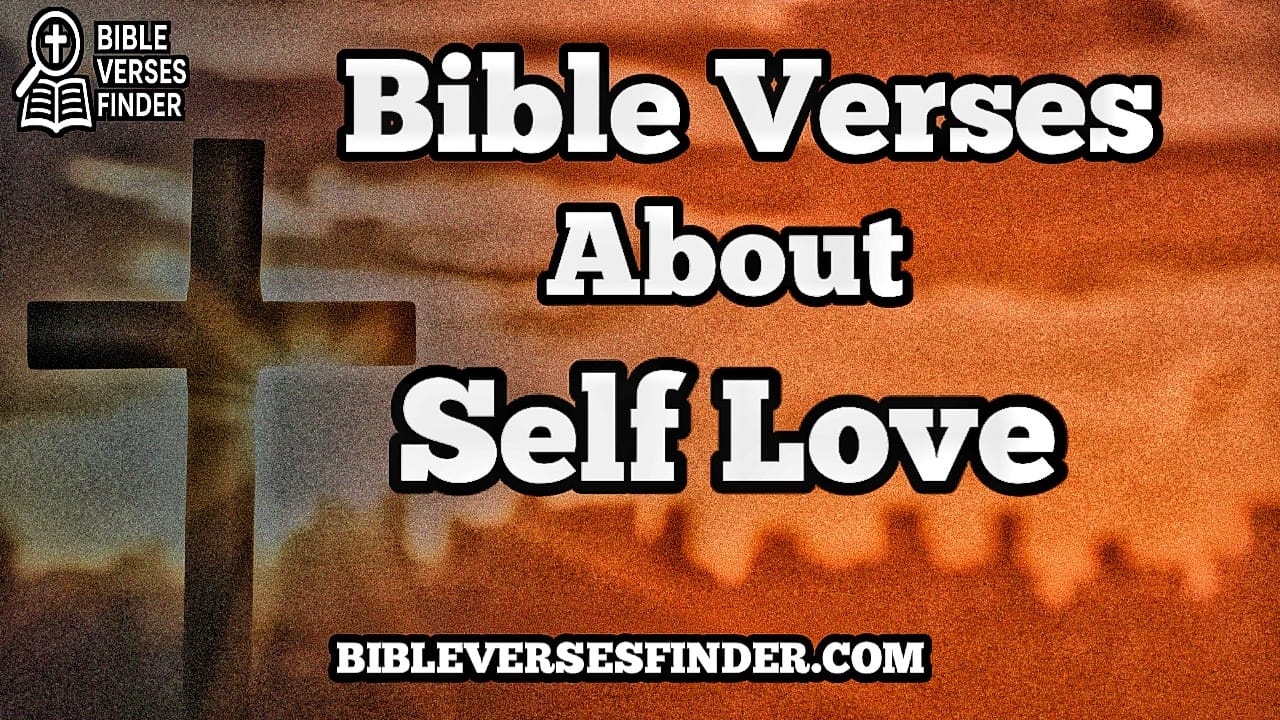In a world that constantly tells us to “love ourselves” through material success, appearance, and achievement, many people are left wondering what self-love really means from a Biblical perspective. The modern idea of self-love often leans toward self-centeredness, but the Bible presents a deeper, more transformative kind of love, one that flows from knowing who you are in God’s eyes.
Must Read: 21+ Interesting Bible Verse About Confidence For You

True self-love isn’t about pride or vanity; it’s about seeing yourself the way your Creator does, cherished, purposeful, and wonderfully made. We shall be sharing with you all an amazing Bible verse about self-love that you all should know. Take your time and read through this post for more details.
Also Read: Is Smoking Weed A Sin Bible Verse – Here Is The Truth
You Are Wonderfully Made — Psalm 139:13–14
“For You created my inmost being; You knit me together in my mother’s womb. I praise You because I am fearfully and wonderfully made; Your works are wonderful, I know that full well.” — Psalm 139:13–14 (NIV)
This verse reminds us that our worth begins with our Creator. Every part of who you are, your mind, body, and soul, was intentionally designed by God.
When you feel unworthy, overlooked, or insecure, remember that God personally crafted you with love and purpose. True self-love begins when you stop comparing yourself to others and start seeing yourself as a masterpiece of divine artistry.
If the Creator of the universe designed you intentionally, how can you treat yourself with anything less than kindness? Honor God by valuing the life and body He gave you through care, gratitude, and confidence rooted in His truth.
Love Your Neighbor as Yourself — Mark 12:31
“The second is this: ‘Love your neighbor as yourself.’ There is no commandment greater than these.” — Mark 12:31 (NIV)
Jesus taught that self-love isn’t selfish, it’s foundational. You cannot pour love into others if you have none for yourself. The command to “love your neighbor as yourself” assumes that healthy self-love already exists.
This kind of love isn’t rooted in ego but in humility and balance. It’s recognizing your value as God’s child and extending that same grace and respect to others.
Ask yourself: Am I treating myself the way I would treat someone I deeply care about? Learning to love yourself with patience and compassion helps you love others authentically without resentment or burnout.
You Are God’s Temple — 1 Corinthians 6:19–20
“Do you not know that your bodies are temples of the Holy Spirit, who is in you, whom you have received from God? You are not your own; you were bought at a price. Therefore, honor God with your bodies.” — 1 Corinthians 6:19–20 (NIV)
Paul reminds believers that we are not accidents or mere physical beings; we are sacred vessels of God’s Spirit. To love yourself biblically is to care for your body and soul as holy ground. That means nourishing yourself physically, spiritually, and emotionally, not out of vanity, but out of respect for the God who dwells within you.
How can you honor God with your life today? Maybe by resting when you’re exhausted, forgiving yourself when you fall short, or avoiding things that harm your peace and purpose. Self-care becomes an act of worship when done with the right heart.
Know Your Identity in Christ — 2 Corinthians 5:17
“Therefore, if anyone is in Christ, the new creation has come: The old has gone, the new is here!” — 2 Corinthians 5:17 (NIV)
Many struggle with self-love because they’re still carrying shame, guilt, or past mistakes. But in Christ, you are made new. Your value doesn’t depend on your past or performance; it depends on Jesus. When you truly believe this, self-love takes on a holy dimension.
You’re no longer defined by what others think or by your failures; you are loved, redeemed, and restored. Loving yourself in Christ means accepting His forgiveness and learning to see yourself through His eyes, forgiven, clean, and whole.
God’s Love Teaches Us How to Love Ourselves — 1 John 4:19
“We love because He first loved us.” — 1 John 4:19 (NIV)
The root of all love, including self-love, is God. When you understand His unconditional love for you, you begin to love yourself not because you’re perfect, but because you are His.
His love permits you to rest, to heal, and to stop striving for validation. You don’t need to earn love — it’s already been freely given through Christ.
Take a moment to sit quietly and receive God’s love. Let it wash away your self-doubt, fear, and insecurities. The more you receive His love, the more you’ll naturally extend it to yourself and others.
Guard Your Heart — Proverbs 4:23
“Above all else, guard your heart, for everything you do flows from it.” — Proverbs 4:23 (NIV)
Self-love also means protecting your heart, your emotions, thoughts, and spiritual well-being. God calls us to live from a place of wisdom and discernment, not emotional chaos or self-neglect.
Loving yourself means setting healthy boundaries, saying no when necessary, and surrounding yourself with people who lift you rather than drain you. It’s not pride, it’s stewardship of the life God entrusted to you.
You Are God’s Masterpiece — Ephesians 2:10
“For we are God’s masterpiece, created in Christ Jesus to do good works, which God prepared in advance for us to do.” — Ephesians 2:10 (NLT)
You are not a mistake. You are God’s artwork, intentionally created with purpose and beauty. Loving yourself biblically means recognizing your God-given purpose and walking confidently in it. The same God who painted sunsets and shaped mountains also formed you with vision and destiny. When you begin to see yourself as God’s masterpiece, you no longer chase validation; you live with assurance, purpose, and peace.
Practical Ways to Practice Biblical Self-Love
>> Speak kindly to yourself. Your words have power; align them with God’s truth, not your insecurities.
>> Take care of your body. Eat well, rest, and move your body as a form of gratitude to God.
>> Forgive yourself. Let go of guilt; Christ already paid the price.
>> Spend time in prayer and reflection. Let God’s Word shape your identity daily.
>> Serve others from a full heart. Loving yourself helps you love others without exhaustion.
FAQ: Bible Verse About Self Love
Let’s take a look at some possible questions and answers regarding this topic. Please read for more details.
1. What does the Bible say about self-love?
The Bible encourages a balanced form of self-love, one rooted in God’s truth, not selfishness or pride. True self-love means recognizing your value as God’s creation, treating yourself with care and respect, and allowing His love to shape your identity. It’s not about arrogance but about seeing yourself the way God sees you — loved, worthy, and redeemed.
2. Is self-love selfish or sinful?
Not when it’s grounded in God’s Word. Selfishness puts yourself above others, but biblical self-love helps you care for yourself so you can serve others better. Jesus said, “Love your neighbor as yourself” (Mark 12:31). This implies that healthy self-love is necessary; you cannot give what you don’t have.
3. Which Bible verse best represents self-love?
One of the most beautiful verses about self-worth is Psalm 139:14 (NIV):
“I praise You because I am fearfully and wonderfully made; Your works are wonderful, I know that full well.”
This verse reminds us that loving ourselves begins with acknowledging how carefully and lovingly God created us.
4. How can I practice biblical self-love in daily life?
Start each day by thanking God for your life and body.
Speak kindly to yourself — reject self-criticism.
Take care of your health and emotional well-being.
Set boundaries to protect your peace.
Spend time in prayer and Scripture to stay rooted in God’s truth.
When your heart is filled with His love, self-love flows naturally.
5. What if I struggle with self-worth or self-acceptance?
If you feel unworthy, remember Romans 8:38–39 — nothing can separate you from God’s love. Your value doesn’t come from achievements, beauty, or popularity, but from being His child. Pray for God to renew your mind and remind you daily that you are loved beyond measure.
6. Does self-love mean ignoring others?
No. Self-love in the Bible is not self-obsession; it’s self-respect balanced with humility. When you love yourself in a godly way, you are actually better equipped to love and serve others without resentment or burnout.
7. What’s the difference between worldly self-love and biblical self-love?
Worldly self-love says, “I am enough by myself.”
Biblical self-love says, “I am enough because of Christ in me.”
One glorifies self; the other glorifies God. Worldly love is temporary and fragile; godly love is eternal and freeing.
Summary:
Self-love in the Bible isn’t about vanity or independence; it’s about acceptance, gratitude, and humility before God. It’s about recognizing that you are deeply loved, fearfully made, and purposefully designed. When you begin to love yourself through God’s eyes, everything changes. Your confidence grows, your relationships heal, and your heart finds rest.
I hope you found this post helpful. Please do well to share this post with family and friends via any of the social media platforms. Do well to stay with us as we do all we can to constantly keep you updated. In all you do, just know that our God can be trusted.





